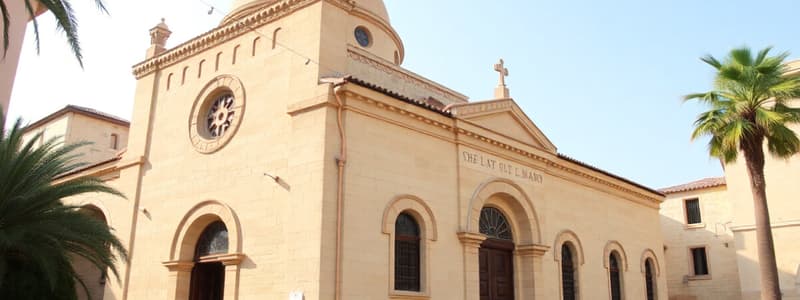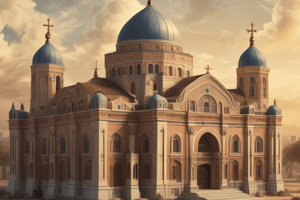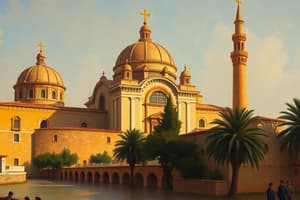Podcast
Questions and Answers
What did the authorities become as the number of Alexandrians adopting the New Faith grew?
What did the authorities become as the number of Alexandrians adopting the New Faith grew?
- Indifferent
- Delighted
- Alarmed (correct)
- Supportive
What did the brethren request of St. Mark when they learned the authorities sought to lay hands on him?
What did the brethren request of St. Mark when they learned the authorities sought to lay hands on him?
- To leave Egypt for some time (correct)
- To stay and fight
- To hide within the city
- To confront the authorities
Who did St. Mark ordain as Bishop for the believers before leaving Alexandria?
Who did St. Mark ordain as Bishop for the believers before leaving Alexandria?
- Barnabas
- St. Paul
- Anianus (correct)
- Luke
Where did St. Mark go after leaving Alexandria?
Where did St. Mark go after leaving Alexandria?
Who invited Mark to Rome?
Who invited Mark to Rome?
What did the Christian community build near the seashore?
What did the Christian community build near the seashore?
Besides a church, what else did the Christian community build?
Besides a church, what else did the Christian community build?
What spurred St. Mark to write the Gospel?
What spurred St. Mark to write the Gospel?
In what year did the described visit to Chalcedon occur, according to the passage?
In what year did the described visit to Chalcedon occur, according to the passage?
Which of the following best describes the Coptic perspective on history, as presented in the text?
Which of the following best describes the Coptic perspective on history, as presented in the text?
How many ecumenical councils are acknowledged by the Coptic Church, according to the text?
How many ecumenical councils are acknowledged by the Coptic Church, according to the text?
According to Cyrus Gordon, what were the Egyptians proud of when they went to Chalcedon?
According to Cyrus Gordon, what were the Egyptians proud of when they went to Chalcedon?
What does the passage suggest is essential to know to fully appreciate the history of the Coptic Church?
What does the passage suggest is essential to know to fully appreciate the history of the Coptic Church?
According to the passage, what do the Copts have a strong leaning towards?
According to the passage, what do the Copts have a strong leaning towards?
What does the passage suggest should be the central focus when studying history?
What does the passage suggest should be the central focus when studying history?
According to the passage, history is the story of whom?
According to the passage, history is the story of whom?
What did foreign rulers offer to soothe the rebellious spirit of Egypt?
What did foreign rulers offer to soothe the rebellious spirit of Egypt?
Where did Hellenistic culture primarily flourish in Egypt?
Where did Hellenistic culture primarily flourish in Egypt?
Who roused nationalistic pride in Egypt in the fifth century A.D.?
Who roused nationalistic pride in Egypt in the fifth century A.D.?
What was the primary language used by Egyptian city dwellers immersed in Hellenistic culture for teaching and writing?
What was the primary language used by Egyptian city dwellers immersed in Hellenistic culture for teaching and writing?
Which Jewish community was considered second only to Jerusalem and the best organized?
Which Jewish community was considered second only to Jerusalem and the best organized?
Who was the well-known Hebrew philosopher from Alexandria?
Who was the well-known Hebrew philosopher from Alexandria?
What motivated Egyptians to establish schools after converting to Christianity?
What motivated Egyptians to establish schools after converting to Christianity?
Besides Hellenism, which other culture had a significant impact during the early Christian centuries?
Besides Hellenism, which other culture had a significant impact during the early Christian centuries?
Who founded the pre-Christian school in Alexandria in 323 B.C.?
Who founded the pre-Christian school in Alexandria in 323 B.C.?
During whose reign was the translation of the Old Testament into the Septuagint accomplished?
During whose reign was the translation of the Old Testament into the Septuagint accomplished?
Why is the translation of the Old Testament called the Septuagint?
Why is the translation of the Old Testament called the Septuagint?
In what year did Emperor Septimus Severus begin persecutions against Christians?
In what year did Emperor Septimus Severus begin persecutions against Christians?
What were the two main components of the School of Alexandria?
What were the two main components of the School of Alexandria?
What was the initial focus of the School of Alexandria's trend of thought, according to modern scholars?
What was the initial focus of the School of Alexandria's trend of thought, according to modern scholars?
What was Clement's primary method of education?
What was Clement's primary method of education?
What does the Greek word "Ikthoos" mean?
What does the Greek word "Ikthoos" mean?
What did the leaders of thought begin to demand to satisfy the needs of the human soul?
What did the leaders of thought begin to demand to satisfy the needs of the human soul?
What does the Greek letter 'i' in 'Ikthoos' stand for?
What does the Greek letter 'i' in 'Ikthoos' stand for?
What was Alexander the Great's goal concerning Egyptian thought after he conquered the Mediterranean world?
What was Alexander the Great's goal concerning Egyptian thought after he conquered the Mediterranean world?
During the second century B.C., what was a common occurrence in Egypt?
During the second century B.C., what was a common occurrence in Egypt?
What did Clement and other teachers of the Church try to reconcile?
What did Clement and other teachers of the Church try to reconcile?
Where did Clement settle after leaving his homeland due to persecution?
Where did Clement settle after leaving his homeland due to persecution?
What happened to the School of Alexandria during the persecution?
What happened to the School of Alexandria during the persecution?
How did Clement die?
How did Clement die?
How many extra days would there be in the nineteenth year of the lunar cycle?
How many extra days would there be in the nineteenth year of the lunar cycle?
What is the maximum number of days in the 13th month of a lunar leap year?
What is the maximum number of days in the 13th month of a lunar leap year?
The lunar solar years are kept correlated by which of the following?
The lunar solar years are kept correlated by which of the following?
Easter's date will never fall earlier than which period?
Easter's date will never fall earlier than which period?
To which range of seasons would Easter be confined?
To which range of seasons would Easter be confined?
Heraclas was a well-known figure in the church during whose time?
Heraclas was a well-known figure in the church during whose time?
Originally, Heraclas's parents followed which religion?
Originally, Heraclas's parents followed which religion?
Flashcards
Council of Chalcedon
Council of Chalcedon
Took place in A.D. 451. The Coptic perspective views it as a continuous event rather than a point in time.
Coptic History
Coptic History
An indivisible, continuous entity. Past events influence the present and future.
Coptic Behavior at Chalcedon
Coptic Behavior at Chalcedon
Refers to the Coptic stance at Chalcedon. They stood firm in their beliefs and withdrew when not heard.
History as Life
History as Life
Signup and view all the flashcards
Pivot of Historical Study
Pivot of Historical Study
Signup and view all the flashcards
Copts
Copts
Signup and view all the flashcards
Coptic Mysticism
Coptic Mysticism
Signup and view all the flashcards
Egyptian Mindset
Egyptian Mindset
Signup and view all the flashcards
Who was Clement of Alexandria?
Who was Clement of Alexandria?
Signup and view all the flashcards
What made Alexandria significant?
What made Alexandria significant?
Signup and view all the flashcards
What was the pre-Christian school of Alexandria?
What was the pre-Christian school of Alexandria?
Signup and view all the flashcards
Who commissioned the Septuagint?
Who commissioned the Septuagint?
Signup and view all the flashcards
What is the Septuagint?
What is the Septuagint?
Signup and view all the flashcards
How did the School of Alexandria change?
How did the School of Alexandria change?
Signup and view all the flashcards
What was the Ptolemies' cultural goal?
What was the Ptolemies' cultural goal?
Signup and view all the flashcards
Why did Hellenization efforts partially fail?
Why did Hellenization efforts partially fail?
Signup and view all the flashcards
Impact of Christian Converts
Impact of Christian Converts
Signup and view all the flashcards
St. Mark's Succession Plan
St. Mark's Succession Plan
Signup and view all the flashcards
St. Mark's Travels
St. Mark's Travels
Signup and view all the flashcards
Paul's Summons of Mark
Paul's Summons of Mark
Signup and view all the flashcards
Anianus' Role
Anianus' Role
Signup and view all the flashcards
Early Christian Community Life
Early Christian Community Life
Signup and view all the flashcards
Gospel of Mark Origin
Gospel of Mark Origin
Signup and view all the flashcards
Nobles' Opposition
Nobles' Opposition
Signup and view all the flashcards
Egyptian Cultural Identity
Egyptian Cultural Identity
Signup and view all the flashcards
Hellenistic Appeasement
Hellenistic Appeasement
Signup and view all the flashcards
Abba Shenouda
Abba Shenouda
Signup and view all the flashcards
Egyptian Hellenistic Immersion
Egyptian Hellenistic Immersion
Signup and view all the flashcards
Alexandrian Jewish Community
Alexandrian Jewish Community
Signup and view all the flashcards
Philo of Alexandria
Philo of Alexandria
Signup and view all the flashcards
Alexandrian Inter-racial Culture
Alexandrian Inter-racial Culture
Signup and view all the flashcards
Early Christian Schools in Egypt
Early Christian Schools in Egypt
Signup and view all the flashcards
Septimus Severus
Septimus Severus
Signup and view all the flashcards
Clement's Writings
Clement's Writings
Signup and view all the flashcards
"Ikthoos"
"Ikthoos"
Signup and view all the flashcards
Clement's Reconciliation
Clement's Reconciliation
Signup and view all the flashcards
School of Alexandria
School of Alexandria
Signup and view all the flashcards
Clement's Exile
Clement's Exile
Signup and view all the flashcards
School's Closure
School's Closure
Signup and view all the flashcards
Power of Light
Power of Light
Signup and view all the flashcards
Lunar Leap Year
Lunar Leap Year
Signup and view all the flashcards
Easter's Timing
Easter's Timing
Signup and view all the flashcards
Former Prominent Town
Former Prominent Town
Signup and view all the flashcards
Heraclas's Profession
Heraclas's Profession
Signup and view all the flashcards
Heraclas's Conversion
Heraclas's Conversion
Signup and view all the flashcards
Flare-up of Persecutions
Flare-up of Persecutions
Signup and view all the flashcards
Jerome's Works
Jerome's Works
Signup and view all the flashcards
Eusebius and Origen
Eusebius and Origen
Signup and view all the flashcards
Study Notes
- When discussing a trip to Chalcedon one guest remarked it must have been recent, to which the speaker clarified the journey happened in A.D. 451.
- Copts consider history an indivisible unit, not ephemeral pictures, so attending Chalcedon in 451 is the same as attending in any year.
- The first three ecumenical councils, acknowledged by the Coptic Church, have decreed laws that are still followed
- Copts still suffer from the consequences of Chalcedon.
- Cyrus Gordon noted that when the Egyptians went to Chalcedon, they were proud of their heritage and beliefs, and when the world didn't listen, they walked out.
- History recounts the struggle of nations for freedom, dignity, liberty aspirations, and heroic achievements.
- To appreciate Coptic Church history, understanding its adherents' characteristics is essential.
- Copts have a strong inclination towards the mystic and spiritual, which Sir Flinders Petrie describes as considering matters before time as essential, unlike Western minds.
- Many Alexandrians adopted the New Faith, transforming into truthful, honest, and contented individuals.
- Pagan's upright behavior was often attributed to encountering a Christian.
- As the number of people joining the Faith increased authorities sought to lay hands on the Apostle Mark.
- St.Mark was pleaded with to leave Egypt temporarily.
- St.Mark ordained Anianus as Bishop, along with twelve priests and seven deacons, entrusting them with the Church's direction.
- St.Mark visited his Church in Pentapolis and then went to Rome upon St.Paul's invitation.
- Paul realized Mark was intended for work in the Nile Valley and summoned him to Rome.
- Paul later testified to Mark's usefulness in serving the Word.
- During St.Mark's absence, Anianus and his helpers continued his work.
- Upon St.Mark's return, he found they had built a church near the seashore, with houses for the poor and strangers nearby.
- The early Christian community lived communally,sharing everything, praying, fasting, and preaching the Word.
- As the number of the Faithful kept growing, St.Mark was asked to write down the teachings of the New Way, resulting in the Gospel according to St.Mark.
- St.Mark's flourishing work infuriated the nobles, who resolved he wouldn't escape them this time.
- The apostle was martyred in 68 A.D.
School of Alexandria
- While the Fathers of the Church were establishing the Faith, they were aided by the Teachers and Deans of the School of Alexandria.
- Alexandria had a long history and attained unprecedented heights in civilization.
- Its pre-Christian school was founded by Ptolemy Soter in 323 B.C.
- Ptolemy Philadelphus encouraged Greek philosophers and extended patronage to other nationalities.
- The translation of the Old Testament was accomplished during Ptolemy Philadelphus's reign, resulting in the Septuagint, created by seventy rabbis.
- The School of Alexandria included the world-famous Library and Museum.
- Modern scholars view the School as transitioning from scientific and literary to philosophical and theological, with the latter starting before Christianity.
- The world demanded a doctrine of salvation to satisfy the needs of the human soul.
- The Ptolemies' zeal for Greek culture made Alexandria a center of learning, aiming to Hellenize Egyptian thought, a goal aspired to by Alexander the Great.
- Egyptians were deeply rooted in their culture and learning.
- Egyptians were willing to absorb other cultures but not at the expense of their nationality or heritage.
- Egyptians' pride in their past was stronger than their love for Greek learning.
- Egyptians were in continuous revolt during the second century B.C.
- Egyptians remained faithful to their heritage and never lost their national or cultural identity.
- Foreign rulers tried to soothe the rebellious spirit of Egypt with a humane culture, mainly in big cities.
- Nationalistic pride remained dormant until Abba Shenouda the Archimandrite aroused it in the fifth century A.D.
- Egyptian city dwellers enjoyed Hellenistic culture, with many becoming steeped in Greek learning, sometimes mistaken for Greeks.
- Hebraic teachings also had a deep impact, with Alexandria's Jewish community being second only to Jerusalem and well-organized.
- The Jewish community had great rabbis and philosophers like Philo of Alexandria.
- Christianity was introduced into the city of inter-racial culture with Greek philosophies, Hebraic teachings, and Oriental doctrines.
- Egyptians felt the need for a school to preserve and spread the teachings of the New Faith.
- St. Pantanaeus was head of the Catechetical School of Alexandria.
- St. Pantanaeus left Alexandria to preach in India, returning later.
- Clement followed him, and he was considered a remarkable man.
- St. Pantanaeus was succeeded by Clement after going to preach to the nations, and some believed that he preached the Gospel of St. Matthew in Hebrew.
- Clement was considered a remarkable man due to his asceticism.
- Clement used writing as a means of education, but little of his original writings remain.
- Clement was the first to use "Ikthoos" (fish in Greek) as a symbol for Christianity, with each letter representing Christ's name and mission.
- Clement represented an age where people believed in a loving Father despite persecutions and mockery.
- Teachers could reconcile Christianity with ancient wisdom, showing how philosophies led to Christ.
- Clement persevered in teaching and writing until the persecution of Septimus Serverus.
- Clement left his homeland and settled in Asia Minor, dying shortly after while his compatriots were still being persecuted.
- The School of Alexandria was virtually closed.
- Martyrs faced fire and sword with faith in the Power of Light overcoming darkness.
- Clement died in peace, away from Alexandria and the School he loved.
A Serene Spirit
- Heraclas, a philosopher and orator, was a well-known teacher in the church during the time of Abba Demetrius.
- Christianity spread
- A Patriarchal letter was written to Origen
- There was another flare-up of persecutions.
- Abba Heraclas died.
- Heraclas was born in Alexandria of pagan parents, who later converted to Christianity.
Studying That Suits You
Use AI to generate personalized quizzes and flashcards to suit your learning preferences.




